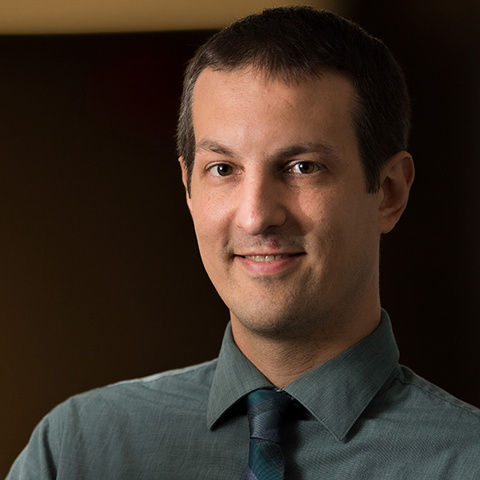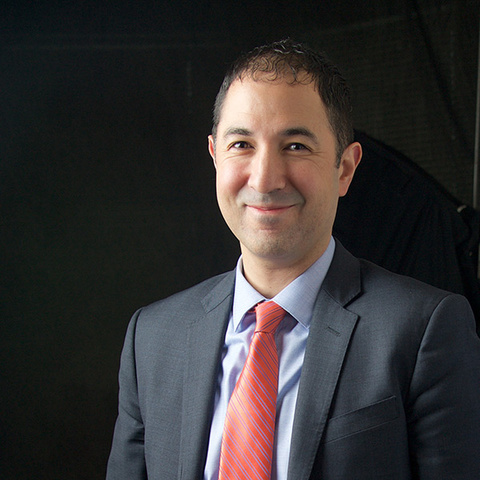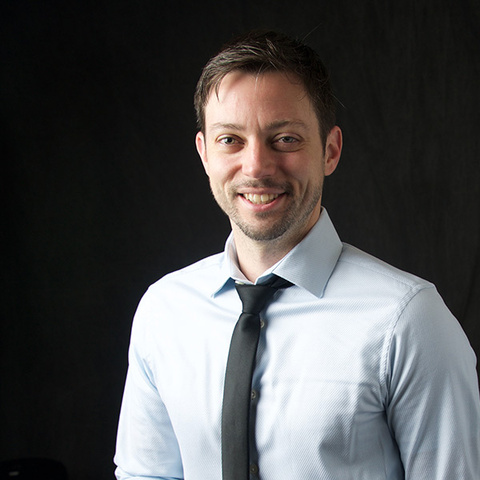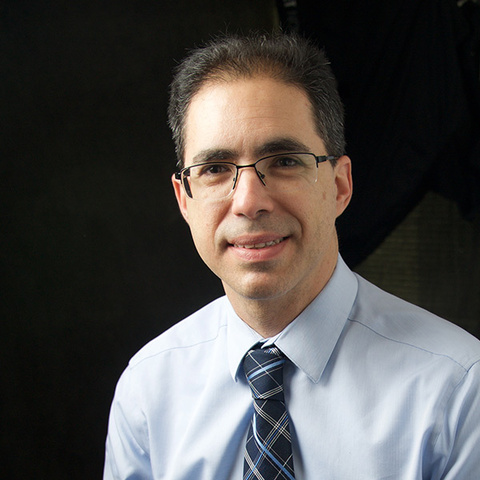It’s more than a coincidence that a handful of researchers from Harvard recently migrated to the University of Iowa. Drawn by the Iowa Neuroscience Institute (INI), Aaron Boes, Tracey Cho, Joel Geerling, and Joseph Glykys cite the institute’s collaborative environment and support for young investigators, as well as the opportunity to launch independent labs, among the key reasons they all chose to go west.
Aaron Boes: First to arrive
Accepting a position at the INI was a homecoming, of sorts, for Aaron Boes (09MD, 09PhD), who enjoys serving as a connection for the Harvard-Iowa pipeline.
“One of the main draws for me was that I had worked here before and I knew the environment,” says Boes, a pediatric neurologist who returned in August 2016 as the INI was being established. “It’s a very friendly atmosphere, very collaborative.”
The Iowa native spent seven years on the East and West coasts, through his residency at the University of California San Diego and his Harvard residency and fellowship at Massachusetts General Hospital and Beth Israel Deaconess Medical Center, in Boston.
While he enjoyed those experiences, Boes welcomed the opportunity to return to the family-friendly lifestyle in Iowa, with shorter commutes, good public schools, and a reasonable cost of living.
“That’s the biggest difference—the work-life balance,” says the father of two.
Boes directs the only lab in the world to assess how the brain responds to transcranial magnetic stimulation in real time using intracranial electrodes in neurosurgical patients. The collaborative environment at the UI was key to developing this approach, which relies on neurosurgical patients. The goal is to use this research to help inform how brain stimulation can be used more effectively as a therapy.
Boes cites PhD mentor Peg Nopoulos (89MD, 93R, 94F), chair and departmental executive officer of psychiatry, and Daniel Tranel, PhD, associate dean of graduate and postdoctoral studies, as instrumental in recruiting him. In turn, Boes has played a role in recruiting Harvard colleagues, including Joel Geerling, who accepted an offer at the UI shortly after Boes did, and Joseph Glykys, who had never been to the Midwest before visiting the UI. Boes also knew Tracey Cho when both practiced at Massachusetts General Hospital.
“I’ve definitely been singing the praises of Iowa,” he says. “It’s been nothing but positive.”
 About Aaron Boes
About Aaron Boes

• MD, PhD (neuroscience), University of Iowa Carver College of Medicine
• PhD mentor: Peg Nopoulos, MD
• Primary research focus: The link between brain structure and function across the lifespan, particularly network-based localization of neurological and psychiatric symptoms. Another focus uses advanced imaging techniques in conjunction with neuromodulation to better understand therapeutic mechanisms of brain stimulation, such as transcranial magnetic stimulation for treating depression.
Tracey Cho: Impressed by students, residents
For Tracey Cho, MD, it wasn't much of a stretch to move from the hallowed halls of Yale and Harvard to the University of Iowa.
“It’s not as big, in terms of the number of faculty, but the quality is absolutely on par,” says Cho, who transitioned last summer to the Iowa Neuroscience Institute from Harvard, where he had served as residency director. “I think Iowa is right up there.”
He and Josalyn Cho(03MD), UI assistant professor of internal medicine (pulmonary, critical care, and occupational medicine)—an Iowa native who earned Bachelor of Science and medical degrees at the UI—were interested in moving to the Midwest to raise their two sons. Cho reached out to George Richerson(87MD, 87PhD), chair and departmental executive officer of neurology, and quickly found a welcoming community, including former colleagues such as Aaron Boes, who even sent real estate updates to Cho.
“It was part of the overall feeling I got about the community here,” Cho says of the caring atmosphere.
A clinician-teacher, Cho spends about a third of his time with patients, many with neurological illness caused by inflammatory and infectious conditions, and the rest in research, teaching, and administration, as vice chair of education and director of the Division of Neuroimmunology.
Among his many roles, Cho anticipates participating in neuroimmunology clinical trials at the UI as a new clinical trial site in the Network for Excellence in Neuroscience Clinical Trials, or NeuroNEXT. The network helps streamline clinical trials for brain, nerve, and muscle disorders.
“We will be one of the sites for cutting-edge treatments of these rare diseases,” he says. “Being a site puts you at the forefront for new treatments and research.”
Overall, Cho says his favorite role at the UI is working with medical students and neurology residents.
“I have been thrilled with the caliber of the students and residents and their enthusiasm,” he says. “They’re a great bunch.”
Less than a year after Cho arrived at the UI, he has already been recruiting faculty, which hasn't been too much of a challenge.
“If we get people here, they're sold pretty quickly,” he says.
 About Tracey Cho
About Tracey Cho

• MA, history and science, Harvard University
• MD, Yale University School of Medicine
• Residency (neurology), Massachusetts General Hospital/Harvard Medical School
• Fellowship, advanced general neurology(autoimmune and infectious neurology), Massachusetts General Hospital
• Primary research focus: Inflammatory diseases that affect the nervous system, including infectious and autoimmune diseases and rare diseases, such as sarcoidosis. Both his practice and research focus on autoimmune neurology, including transverse myelitis, neurological infections and the overlap of rheumatology and neurology.
Joel Geerling: ‘In love with the place’
Joel Geerling, MD, PhD, is no stranger to the Midwest. The St. Louis-area native earned his medical and doctoral degrees at Washington University School of Medicine in St. Louis and undergraduate degrees in math and chemistry from St. Louis University.
Still, making the trek to Iowa from Harvard and Beth Israel Deaconess Medical Center in Boston—where he was a postdoctoral fellow in neurology, staff neurologist, and fellow in cognitive and behavioral neurology—wasn’t in his immediate plans.
A meeting with UI neurology DEO George Richerson accelerated his timeline.
“Iowa had been on my radar, but I really wasn't ready to finish my postdoc and fellowship at that point,” Geerling says. Richerson, however, made a convincing case to visit Iowa, followed by interviews and an offer for research funding and a teaching position, “and I started to fall in love with the place.”
Geerling learned modern neuroscience methodology under mentors such as Clifford Saper, MD, PhD, but resources for startups are scarcer at Harvard, he notes, which was another factor in his move to Iowa City. “Here, there was a lot of opportunity and investment in young faculty.”
Knowing that Aaron Boes, one of his research collaborators, already had been recruited to the UI also helped in his decision, he says.
Geerling joined the INI in October 2016 and has since been immersed in research, teaching, and patient care, which includes diagnosing and treating conditions such as Alzheimer's disease and sleep disorders.
He continues research started with his PhD mentor, the late Arthur Loewy, in aldosterone and sodium appetite, among other projects.
“Things related to the nervous system and the brain in particular, I saw that as a big frontier,” Geerling says of his interest in neuroscience, adding that he appreciates the collaborative environment at the INI, with molecular physiology, biomedical engineering, pharmacology, internal medicine, psychiatry, and neurosurgery among the disciplines represented by his clinician-scientist colleagues.
“For me, it was an opportunity to start fresh with a tight-knit, future-oriented program. I don't have any regrets.”
 About Joel Geerling
About Joel Geerling

• MD, PhD (neuroscience), Washington University School of Medicine
• PhD mentor: Arthur Loewy, PhD
• Primary research focus: Genetic techniques to isolate and manipulate neurons that mediate basic physiologic functions including sleep, appetite, bladder control, and thermoregulation, with a primary focus on the arousal system, which maintains conscious wakefulness. The hope is to improve treatment options for patients with neurologic diseases that affect the mind and body, such as Parkinson's, Lewy body disease, multiple system atrophy (MSA), Alzheimer's dementia, frontotemporal dementia (FTD), and chronic hydrocephalus.
Joseph Glykys: Eager to see INI grow
Joseph Glykys, MD, PhD, had never been to Iowa before he was recruited to the INI. His formative years were spent in Venezuela's tropical climate, but the polar vortex that enveloped the Midwest when Glykys arrived at the INI in January wasn't too much of a shock.
He had spent the preceding years in his Harvard appointment at Massachusetts General Hospital in Boston, where he and his family became accustomed to cold winters. Weather aside, it was the opportunity to start his own lab that was the main draw to join the INI.
“I loved my time at Harvard. It was a great experience,” Glykys says. “But I wanted to be independent.”
The layout of his lab, near colleagues and the patients he sees, was another attraction.A pediatric neurologist, Glykys is interested in identifying better ways to treat seizures, especially for infants who don’t respond well to medications.
Born in Brooklyn, New York, Glykys moved at age 3 with his family to Venezuela, where his mother continues to practice as a medical doctor. His parents influenced his interest in science, and after earning his medical degree in Venezuela, Glykys went to UCLA to pursue his doctorate before making his way to Harvard.
Besides recruiting him, Alex Bassuk, MD, PhD, director of the Division of Pediatric Neurology, and INI director Ted Abel, PhD, serve as role models for what can be accomplished by rising through the ranks, Glykys notes.
“They want the young faculty to grow,” Glykys says. “It’s great to come to a place where things are growing. I wanted to be a part of that.”
 About Joseph Glykys
About Joseph Glykys
• MD, Universidad de Carabobo, Valencia, Venezuela 
• PhD (neuroscience),UCLA
• PhD mentor: Istvan Mody, PhD
• Primary research focus: How seizures and brain injury result in water and chloride accumulation in neurons. Increases in neuronal chloride concentration alter the inhibitory system of the brain and lead to a poor response to anti-convulsive medications, particularly in infants. The long-term goal of research in the Glykys lab is to treat seizures by better understanding the inhibitory system of the brain and finding novel approaches to enhance it, as well as to decrease neuronal swelling.